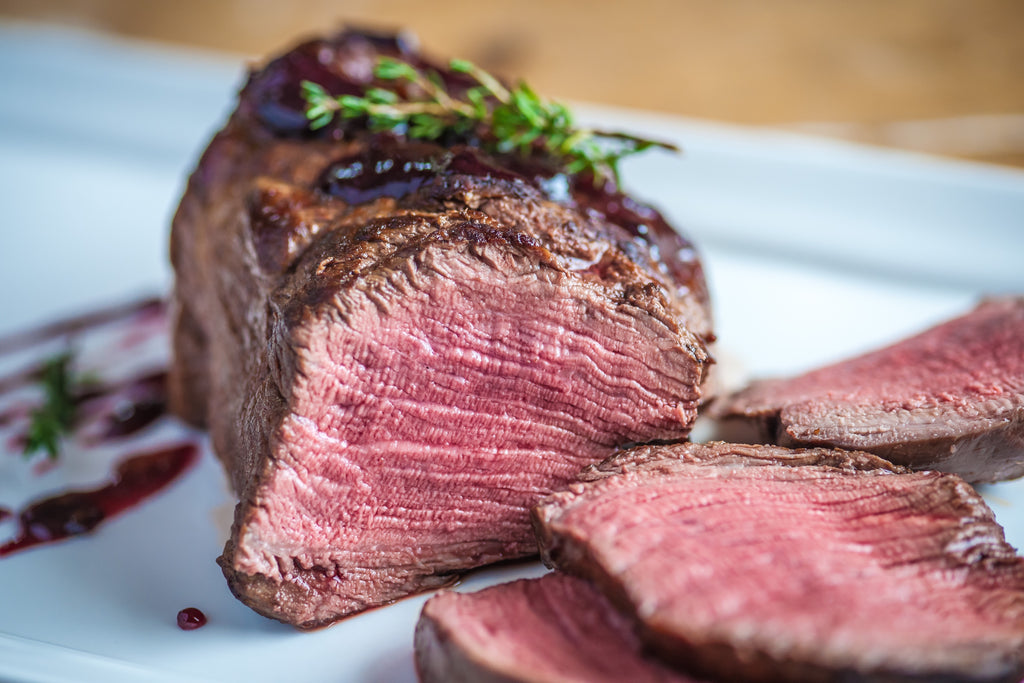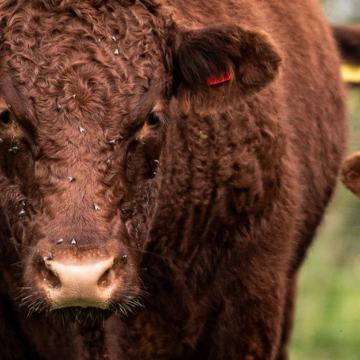As a concept, farm to fork emphasises the direct connection between how our food is produced and the moment that it is consumed. As a broader philosophy it emphasises the benefits of eating locally and seasonally, reducing the carbon footprint associated with food transportation, and enjoying fresh, nutritious and unprocessed food that is sustainably produced. Here at Pipers Farm, we have rigorously tested each part of our farm to fork process, carefully trialling and tweaking every single aspect along the way, to ensure the end result is food that you can enjoy with complete confidence.
It’s a journey that starts with our network of incredible, passionate, small scale farmers, who adopt regenerative farming techniques, nurturing their land and their livestock. It ends with you - our conscious and considered customers - actively supporting ethically and sustainably sourced meat, knowing that every single bite of our delicious slowly reared beef makes a difference. It’s a fascinating journey and one that we are excited to take you through.
Rearing Native Breeds
Step 1 of the farm to fork journey of our slowly reared beef starts with our commitment to native breeds that we know play an important role in regenerative farming. Native breeds provide a sense of identity to our communities, create a sense of pride for centuries old livestock and reducing climate impact of industrial, non-native beef farming. Alongside the likeminded, small-scale farms that we work with, we rear predominantly Red Ruby Devon cattle but also Galloways, English Longhorns, Shorthorns, Highland Cattle and Herefords.
Within these herds, breeding cows thrive on the fauna and flora of their native landscape, converting this pasture into mother’s milk - the ultimate source of nutrition for their calves. The calves stay alongside their mother for at least 9 months, maximising the benefits of the milk until the point that the supply naturally dries up, having imparted its goodness to strengthen the calves bones and boost their natural immunity, hopefully reducing the need for any medicine.
Beyond their mother’s milk, our calves (and indeed all of our cattle) are 100% grass fed and grass finished; they never consume cereals or soya, but feast on grass year-round, and silage or hay during the winter months, when they may be moved inside to cattle sheds. This is for the benefit of both the cattle health and the health of our soil, reducing damage to the soil structure and ensuring good recovery of grass supply for the warmer months.
Our beef cattle play a hugely important role in sustaining the beautiful, natural grasslands that are mostly unsuitable for growing other food crops. When our cattle are ‘chewing the cud’ they are repeatedly chewing the forage, ensuring no nutritional value is wasted. Their dung - returned to the pasture from a healthy gut - provides food for insects as well as the billions of soil bacteria, which creates sustainable biodiversity. This is an integral part of the Pipers Farm philosophy and demonstrates the deep connection between rearing meat and nurturing our beautiful planet.
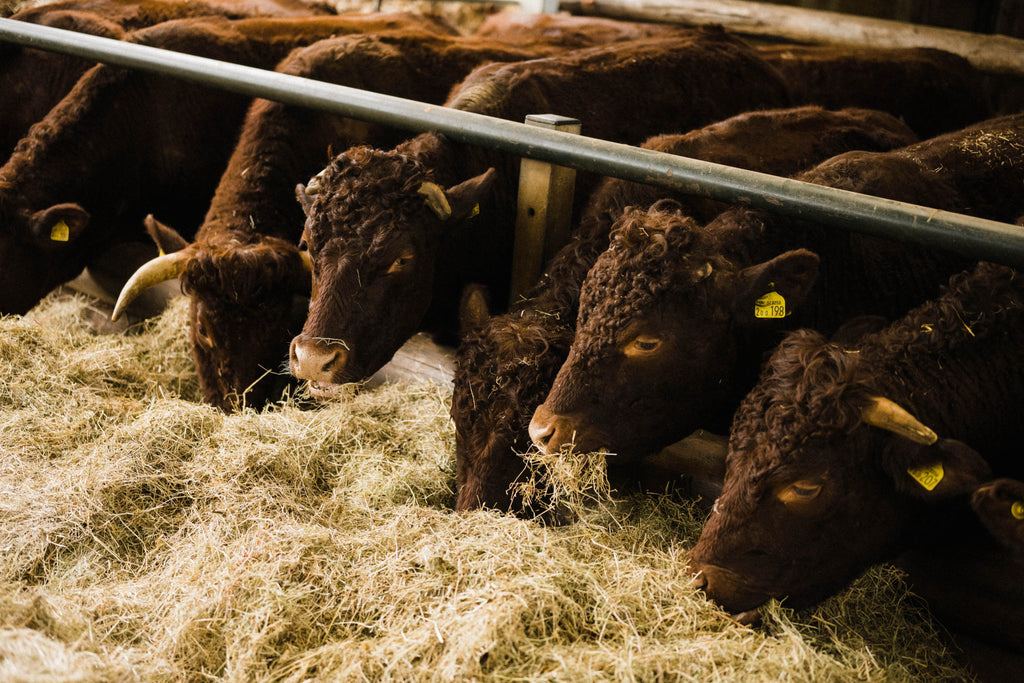
Supporting Small Scale Abattoirs
The next step of the farm to fork process involves a visit to the abattoir. It is an unfair misconception that farmers are immune to emotion when their livestock enter the food chain. Slaughter is a solemn experience for all. Vast amounts of time, effort and money are invested into rearing livestock; a good death - free from pain and fear - and one that provides delicious food for the community, is a source of great pride. As farmers, we are part of nature: a complex system that requires an unwavering respect for all natural life. Death too is part of nature. We are incredibly proud to support the network of small scale abattoirs - nurturing tradition, supporting local communities, and closing the loop in true artisan meat. This should not be a faceless process hidden behind closed doors, but one that is celebrated and acknowledged with respect and gratitude as part of the farm to fork journey.
Our cattle are slowly reared until they have reached natural maturity, usually about 31 months. Then, our farmers will assess their herd, their skilful eye noting condition, selecting those that are ready for slaughter and reaching out to their local abattoir.
We insist that our farmers use local, farmyard based abattoirs. Over the past few years, over a third of the UK’s small abattoirs have closed. No small, local abattoirs = no local, traceable meat; it is as simple as that, and one of the key drivers in our insistence to support their survival. It’s also important to note the impact small scale abattoirs have on animal’s health. It may seem nonsensical to consider the wellbeing of animals that are quite literally on their way to slaughter, but this is possibly the starkest difference between ethical farming and industrial farming. Within the industrial farming system, animals that may never have left their farm are suddenly travelling for hours to be slaughtered, experiencing great stress and discomfort. Here at Pipers Farm, the welfare of our cattle remain of utmost importance right up until the very end.
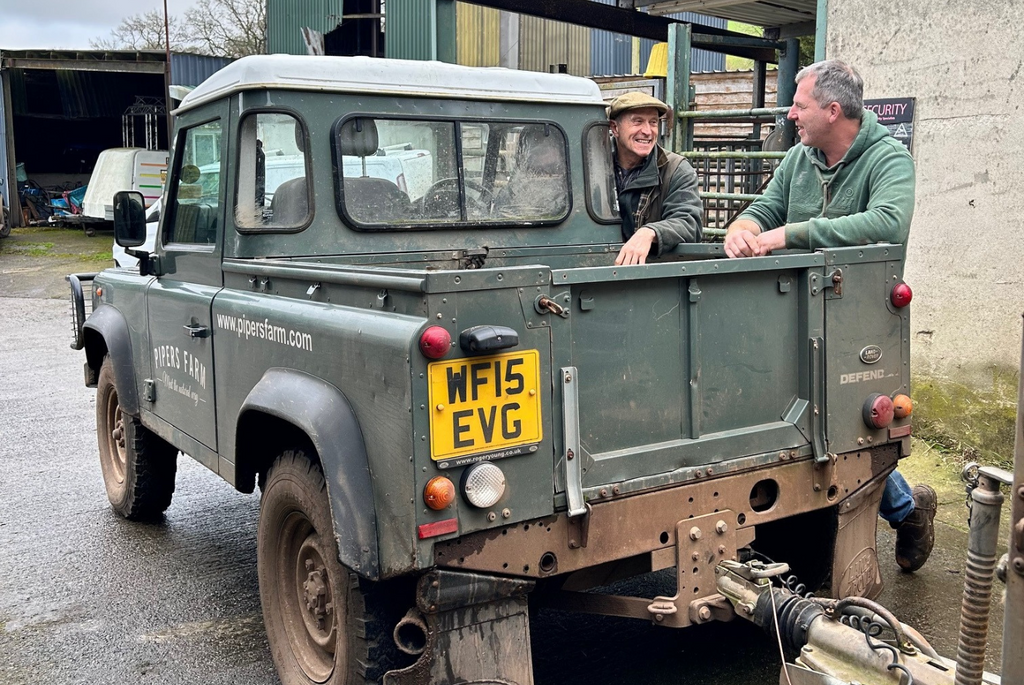
Championing Artisan Butchery
The next step in the farm to fork journey for our slowly reared beef cattle takes place at our very own Butchery.
We have an entire team of highly skilled butchers, who process each and every carcass that enters our supply chain on a daily basis. Our butchers are an integral and highly valued part of the team, with our Head Butcher, Darren, having been with us for 15 years.
We take on apprentice butchers and provide full training, but also often retrain chefs, acknowledging their natural affinity to butchery. Chefs hold a deep understanding of how people like to cook, as well as an eye for detail, enabling the exceptional end result we strive for.
In traditional methods of butchery, meat is cut into squares that could stretch along three or four different muscle groups. These complex muscles all benefit from slightly different handling and cooking times, making it hard to achieve the perfect taste and texture. Here at Pipers Farm, our butchers adopt a method called seam butchery. This consists of us seaming out each individual muscle, following the sinew and the lines of muscle: treating every part of the meat as it should be, to ensure the ultimate cooking and eating experience.
Our carcasses are delivered from the abattoir to our butchery completely plastic free; only when we cut and wrap our meat do we add plastic to our products in order to meet food safety protocols and get the food to you safely. Upon arrival at our butchery unit, all of our beef is hung on the bone for at least four weeks, to develop a wonderfully rounded depth of flavour and enhance the texture of the meat. It this is traditional approach - allowing weeks, not days - that is crucial in achieving outstanding quality. Our focus isn’t on maximising speed, productivity and profit. It’s about ensuring every single carcass is handled with respect, skill, patience and meticulous attention to detail.
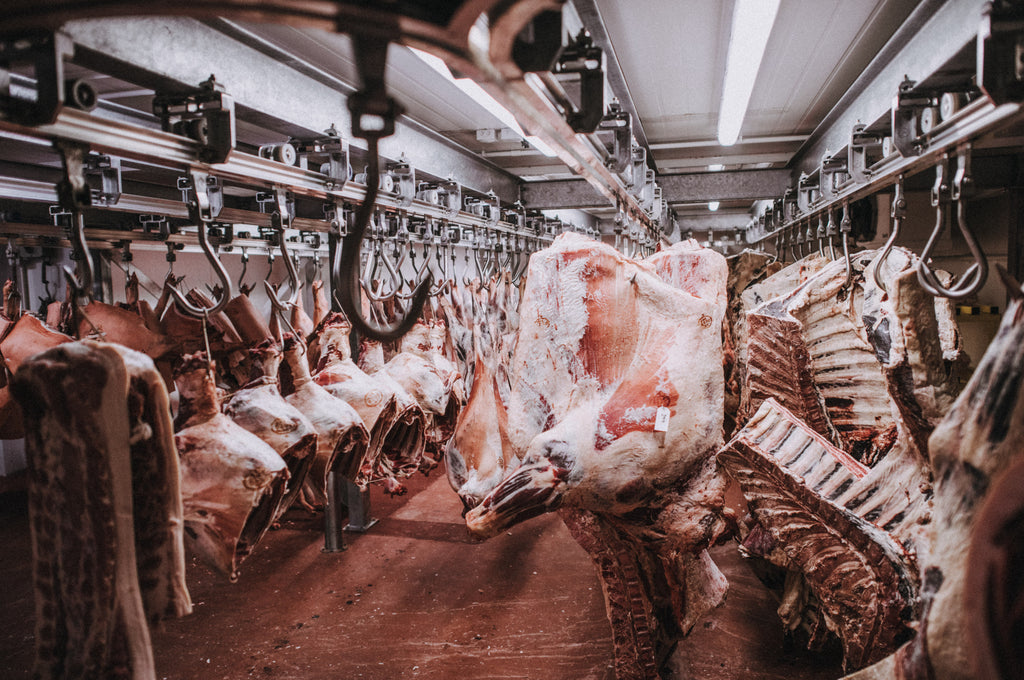
Freezing: Nature's Best Preservative
The penultimate stage of our slowly reared beef farm to fork journey takes place mostly within minus temperatures.
Freezing is nature’s best way of preserving food. We blast freeze our meat at the perfect moment, locking in a whole heap of vitamins, minerals and nutrients and ensuring your food has the best possible taste and texture. Blast freezing means we do not need to add any artificial preservatives or chemicals to our meat, “gas flush” or do anything else unnatural to your food. It is the purest, healthiest and most natural way to store our meat and ensure its quality is retained throughout the dispatch process.
Despite its wonderful benefits, frozen food has suffered from a sorry reputation over the decades. Perhaps it’s down to associations with the poor quality produce found in the freezer aisles of high street supermarkets, or possibly due to early experiences of eating mushy, tasteless meals.
Rest assured, freezing technology has improved massively since this mushy era, most notably with the advent of the blast freezing tech that we adopted early on. Our blast freezer is essentially a super cold freezer, fan-powered to circulate the air and drop the temperature of food far more rapidly than a standard freezer could. This produces much smaller ice crystals than conventional freezing, which in turn doesn’t disrupt the structure of the food, safeguarding the flavour and texture. Once our beautiful beef (and indeed all of our other meat) has been blast frozen, it can be transferred to any standard domestic freezer without the ice crystals altering into a larger, food damaging size.
Ensuring our beef arrives with you in its frozen form is another vital component of our farm to fork process. Our beautifully butchered, portioned, blast frozen and packaged beef is carefully packed with ice blocks into wool pouches; these are 100% home compostable and biodegradable, meaning that it can be added to a compost heap where it will naturally break down a release a whole host of lovely nutrients to feritilise your plants naturally; imparting goodness back into the food chain once again.
The pleasure of eating a delicious plate of food
Every step of the farming journey leads to the pleasure of eating a delicious plate of food. Over the past few days, we have walked you through the #farmtofork journey of our slowly reared, native breed beef, and today we have reached the final step: enjoying a delicious plate of food.
Our beef boasts intense, mature flavour and tender texture that is a world away from the mass produced meat that lines the supermarket shelves.
Meat that has been slowly reared, humanely slaughtered, skillfully butchered and meticulously dispatched deserves to be cooked beautifully. That’s why we go to extra lengths to provide useful cooking instructions alongside each and every cut of beef available on our website, alongside a whole host of delicious recipes to use as culinary inspiration.
These recipes don’t just showcase the fanciest cuts, but the more humble parts of the carcass too. Alongside guidance of roasting ribs of beef, and searing sirloin steaks, we are also proud to encourage our customers to cook with Ox liver and kidneys, to make broths with our beef bones, and to incorporate suet and dripping into their everyday cooking. This is all part of our mission to embrace every part of the animal; not only does it reduce food waste, but it ensures great respect and appreciation for the efforts taken throughout the journey from the farmyard to the kitchen.
Explore our full range of slowly reared, grass fed, native breed beef and experience for yourself the incredible eating experience that occurs as the end result of this wonderful yet complex farm to fork journey.
